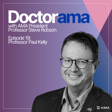Become a Creator today!Start creating today - Share your story with the world!
Start for free
00:00:00
00:00:01

Episode 13 - Dr Jane Tiller
In episode 13 of Doctorama AMA President Professor Steve Robson chats with Dr Jane Tiller.
Anyone concerned about genetic discrimination can write to the govt before 31 Jan 2024 and ask for a total ban on life insurers using genetic results to discriminate: https://discrimination.good.do/total_ban_genetic_discrimination/
Recommended
Transcript
Introduction to Dr Rama's Podcast
00:00:00
Speaker
It's 2024 and you would think that in this era, the more information you had to arm yourself about your possible risk of future diseases, the better it would be. But there are actually disincentives to getting that information about your predisposition about disease. And we're going to learn all about that today on Dr Rama.
00:00:23
Speaker
You're listening to Dr Rama with Steve Robson, bringing you the best of health, medicine and people.
Jane Tiller's Diverse Background
00:00:31
Speaker
My guest today is Dr Jane Tiller from Monash University. Welcome to Dr Rama, Jane. Thanks, Steve. Now, you have one of the most extraordinary sets of qualifications that I've encountered in a long time. And I can't get my head around whether you're primarily a lawyer.
00:00:47
Speaker
or whether you're primarily a genetic counsellor or whether you're primarily a public health researcher. Can you help me work out which one you think of yourself as most?
00:00:56
Speaker
That's an interesting question. I am all of those and I bring all of those skills and all of those areas to the work that I do. But I guess the public health researcher element is what brings those things together because my clinical genetics experience really contributes to my understanding of the impact of genetics on public health. But my legal background and my regulatory understanding really helps me to understand how
00:01:23
Speaker
some of the ethical issues and some of the legal issues that exist impact on people's access to genetic testing and the protection of their information when they have genetic testing. And so while public health is what has brought this all into a happy vortex, all of those skills are still very much live and in the forefront of what I do.
00:01:42
Speaker
Now Jane, it really is a vortex. I would love you to just step me through how you landed where you are now. Were you a counselor first? Were you a lawyer first? How did it all come about and how did you land where you
Transition from Law to Genetics
00:01:54
Speaker
are now? Sure. So I started with a double degree in law and genetics. I always wanted to be a lawyer, but I studied sciences at school and really loved science and biology, chemistry, things like that.
00:02:07
Speaker
And so I ended up in a double degree. I majored in genetics and had a BSc, Bachelor of Science and a Bachelor of Laws. When I left uni, I had no real interest in being a lab tech. I didn't want to pipette things or sit in the lab and do lab work and probably didn't have a really good understanding of what else I could do with a science degree other than technical science work or teaching.
00:02:33
Speaker
really enjoyed law and that had always been my plan. So I went into the legal field. I was a corporate lawyer for about seven years and worked for some top tier firms and did a lot of, I was a corporate litigator and I worked in resources. So really enjoyed engaging with expert reports and scientific reports and the scientific aspects of some of those cases, but really had an interest in getting back more into public health and into the genetic side of things.
00:03:02
Speaker
And so I decided after about seven years to go back and get my master's in genetic counseling, which is a field that not many people know a lot about. And a genetic counselor is an allied health professional who helps people understand and make sense of genetic information, understand what it means, make decisions about genetic testing, and also helps people to communicate information about genetics with family members, which of course is very important because
00:03:32
Speaker
As we know, diseases can be hereditary, they run in families, and that means if we find a genetic condition or a risk in one person, that will also affect their family members. And so I moved into genetic counseling thinking that perhaps that would be my new career, that I'd become a genetic counselor and that would be it.
Balancing Law and Genetic Counseling
00:03:52
Speaker
But as I moved into that field and started working on it, I came across some of these really interesting
00:03:59
Speaker
and concerning ethical and legal issues that exist in the genetic space and moved into this field of public health and ethical, legal, social issues that we'll talk about a bit more. Jane, I'm trying to get my head around the change in mindset between being a corporate litigator, which sounds incredibly scary to me, and being a genetic counselor, which involves sitting down and methodically
00:04:24
Speaker
getting a lot of information from people. How do you switch your mindset from those two really diametrically opposed lifestyles? I think I've always had two parts within me, and both of those things have always existed. And it's interesting because as a lawyer, I struggled with
00:04:45
Speaker
I guess that lack of face-to-face contact and public health dimension in the work that I did, I really loved engaging with clients. I loved writing witness statements and engaging with witnesses to hear their stories. I was also a very good lawyer. I really liked being a lawyer. Intellectually, I was very stimulated and engaged in that work and I really enjoyed it. But sometimes I struggled with the lack of
00:05:15
Speaker
human compassionate element or I guess heart elements that came with being a corporate litigator.
Challenges in Genetic Knowledge
00:05:23
Speaker
Moving across into public health and genetics obviously had a lot of that face-to-face contact, patient engagement, human stories and sometimes in that work I really struggled with that lack of strong intellectual rigor and stimulation that being a corporate litigator brought and so
00:05:43
Speaker
both of those elements exist within me and I've really struggled to find something where both of those elements can coexist and I think that's where where I've come to now is a place where I can engage with the human element, I can engage with public health and prevention and all those things I'm passionate about and also bring in the skills that I have, the intellectual ability that I have to engage with
00:06:08
Speaker
complex legal issues and advocacy and those kind of things and bring them into my work. Well Jane I take my hat off to you managing that that dichotomy in what you do because I'm sitting here shaking thinking about the fact I'm talking to a corporate litigator and it is really it's scaring me. Don't don't worry.
00:06:29
Speaker
Jane, one of the things that I've noticed is the absolute explosion in genetic knowledge and understanding. And I'm really curious as to how you stay current and keep up to date with what seems to be an extraordinary increase in both the amount of knowledge and the application of that knowledge. It must be difficult for you.
00:06:49
Speaker
It is difficult. I think that is difficult for anybody in any field. It's difficult for the legal profession. It's difficult for the medical profession. I think you could ask that question of any practitioner in any field, because not only is the explosion of information always growing, but with things being online and with the
00:07:11
Speaker
information being readily available at our fingertips. The amount and the volume of publications and knowledge that is emerging in any field is enormous.
Risks of Genetic Testing
00:07:22
Speaker
And I think one of the key things
00:07:24
Speaker
is to try to focus on your area of expertise. Obviously, I'm interested in all sorts of things. I'm interested in lots of elements of law. I'm interested in lots of elements of genetics and the medical profession and public health. But if you try and read everything about every area that you have some area of interest in,
00:07:45
Speaker
you obviously can't stay current. And so focusing on what are the things that I really am seen as an expert on, that I need to be making sure that the things that I say are accurate, that I'm not misleading or that I'm not behind in current expertise.
00:08:00
Speaker
As you say, obstetrician might be interested in genetics and that might be relevant to their field, but really, if they're not up with the latest in obstetrics, then they're failing their patients. In my area, obviously, I need to be very well versed on what is happening both in Australia and internationally in the areas of discrimination and genetics and privacy.
00:08:24
Speaker
and those kind of protections and what's happening in public health and genetics and genetic advances. They're the things that are my bread and butter that I need to make sure I know about. And everything else obviously has to have its place when I have time and when I can.
00:08:39
Speaker
Jane, this brings me to an area of incredible interest. And this is where you and I have spoken quite a number of times recently. And it's around the fact that intuitively, it would make sense to me that the more information you have about your predisposition to conditions and diseases, the better because you have this forewarned mindset.
00:09:03
Speaker
But it places you at some risk of discrimination in a tricky legal position. Would you like me to or would you be able to talk me through that current situation where patients are if they get important genetic information about their previous positions? Yeah, absolutely.
00:09:19
Speaker
I have been passionate for some time, obviously, about the power of genomics and there is a huge amount of power in getting genetic information, both for prevention, preventive health, finding out about genetic risk that people can do something about, but also in terms of diagnosis of disease, guiding treatment of disease, guiding the most appropriate medications to use, there are all sorts of
00:09:46
Speaker
things that can be done with genetic information when we're moving into an era of medicine where almost every type of disease has some elements in it where genetic testing will become important either to prevent, to diagnose, to treat, to better decide how someone can be managed in terms of a condition.
Impact on Insurance and Testing Reluctance
00:10:06
Speaker
But as you've alluded to, in Australia we do not have good protections in all elements of our genetic information and against discrimination.
00:10:17
Speaker
So many other countries have acted to protect people's genetic information from discrimination from third parties, especially insurers, which is something that people are very concerned about. But in Australia, life insurance companies are allowed to use your genetic results to say, you are at risk of something and therefore we are going to discriminate. They might
00:10:39
Speaker
deny you cover altogether. They might increase the cost of your premium or put conditions on your premium. And we're talking here about life insurance. Health insurance is not affected in the same way.
00:10:51
Speaker
health insurance is community rated, and that means everyone gets the same cover for the same cost. Health insurers can apply what's called a pre-existing condition rule if people already have a diagnosis, but they can't change the cost of a premium based on genetic information. But life insurers can, and that covers, so death cover, what you would think of as life insurance, also income protection, disability insurance, and those kinds of insurances
00:11:20
Speaker
And because of this, when we tell people they're coming for a genetic test, we're telling them that it could save their life. It could save the life of their family members. It could diagnose better or guide treatment better. And we say, have you thought about the implications that this might have on life insurance? And some people say, in that case, I don't want this test. I'd rather not have the information. I'd rather not put my financial future at risk. I will walk away and not find out this information because of my fears.
00:11:49
Speaker
about my financial future or my family's financial future and that is a real tragedy.
00:11:54
Speaker
Jane, that really is extraordinary. And of course, forgive me, I'm a very naive person. I would have thought that if you have information about risk, it allows people to mitigate or deal with risk. And it actually takes the unknown out of things for insurance companies. And I thought the more information, the better. So this is really alarming at the moment, a situation that you might find that you have
00:12:20
Speaker
a mutation or something, and they can actually deny you cover. That's really an extraordinary situation here. And the fact is that, especially if we're talking about prevention,
00:12:35
Speaker
If someone has, for example, a BRCA1 mutation or BRCA mutation, which is one many are familiar with, Angelina Jolie famously had this and wrote about it. She removed her breasts and her ovaries to make sure that she didn't get cancer and reduced her risk of cancer down to almost nothing.
00:12:54
Speaker
If someone has this kind of information, they can take significant preventive steps. They can go into high risk screening, they can have surgery. From an insurer's point of view, they are a much better risk. To ensure someone who's found out about their risk, who has taken preventive steps, who's been proactive, is obviously much better for an insurer because they're less likely to die and claim on their insurance. And insurers would recognize this. Insurers recognize that that is
00:13:21
Speaker
an important part of preventive health. However, those same people, if they don't get genetic testing, are able to go and get insurance at standard rates, not get penalized, not find out about their risk, and they're more likely to contract cancer and die of cancer than if they'd had the testing, but they're not being discriminated against. And so we have a situation where people are choosing not to have information, they're choosing not to protect their health,
00:13:50
Speaker
to get insurance and then their worst risks for the insurer because they've chosen that course of action. And it doesn't make any sense, but it's the position we find ourselves in.
Family Implications of Genetic Testing
00:14:01
Speaker
That's a really extraordinary, really quite unique situation where there's a financial disincentive to actually get the sort of information. Can I ask, and I guess one of the things that we know is that you inherit your genes.
00:14:15
Speaker
Sometimes there are mutations, but in general you inherit them. So the information you get has applicability to other family members and relatives. Is this a thing that you saw both in your counselling or in the legal advocacy role you have about people not having tests and not telling relatives results? Where do we stand on all of that?
00:14:43
Speaker
It is something that we see all the time. And as part of the work I've been doing on this issue in the last number of years, I've been working on it for about seven years since I moved across from my legal role. And in the last three years, we actually gained some funding from the federal government to monitor the current situation of genetic discrimination and the current regulatory situation. And we did research with health professionals and researchers and
00:15:13
Speaker
patients and consumers and financial advisors to say, what is happening? Is the current regulatory solution sufficient? And we found vast numbers of people said it is not sufficient and legislation is needed from the government in this space. But one of the big concerns that came out both from patients who'd been tested from the general public and from health professionals is this idea that when people are told that there is a risk for insurance,
00:15:41
Speaker
Many of them won't have testing. Many people will walk away and decide they don't want the information. And I've seen that in my own practice as a genetic counselor. At Monash University, we are also running a pilot study of population level genetic screening, and that is testing people for medically actionable risk. We're looking at a few different conditions for genetic heart disease and also some cancers
00:16:08
Speaker
And we're offering young people between 18 and 40 a genetic test to tell them, are you at risk of these things that you can do something about? And we had tens of thousands of people sign up to say, yes, I want this kind of genetic testing. I want to be proactive about my health. But when we sent them the consent materials and they read about the insurance implications, many of them said, actually, I changed my mind. I don't want this information because now I'm worried about my insurance in the future.
00:16:36
Speaker
So it's not a hypothetical concern. It's something that we see in clinic all the time. We see it in research all the time. And it's the most prevalent issue that I hear from clinicians and researchers in genetics. Any conference that you go to, any presentation that is given where they talk about barriers or ethical issues, they will always have a line that says, and then there's these insurance implications. It has to be part of every discussion that a genetic clinician has.
00:17:02
Speaker
with people when they talk about genetic testing, it's on every consent form. If you're going to be involved in a research study for genetics, it is pervasive. And it's this black cloud that hangs over research and clinical genetics and the future of genomic medicine.
Advocacy for Legislative Change
00:17:17
Speaker
Jane, that really is a black cloud, but there could be a silver lining at the moment in that cloud. And I understand that there's a potential for change in the legislation in Australia. Can you tell me a little bit about that?
00:17:30
Speaker
Yes, we are very, very excited about this, and we're excited about the possibility for this. Like I said, I've been working on this issue for many years, and we brought out the results of our research study in the middle of last year, so June 2023, and we made recommendations to the government to say, you need to follow other countries like Canada who have banned this completely.
00:17:53
Speaker
and introduce legislation in Australia to remove the use of genetic test results by life insurers. The government has thankfully taken this really seriously and after a lot of advocacy and effort, the government has introduced and announced a consultation on this issue. And so that means that there is a consultation paper that's been put out by the Treasury Department. Obviously, this is relevant for the Health Department as well, but because
00:18:22
Speaker
life insurers are part of the financial services system. It's the Treasury Department and the Financial Services Minister that are responsible for this piece of regulation. And they have put out several options that could happen in terms of changes in regulation and policy. And one of them is to introduce a complete ban on using this like they've done in Canada. One of the options is to introduce a partial ban that maybe has some exceptions
00:18:47
Speaker
And one of the options is to introduce a financial cap. So up to a certain financial limit, people could get insurance without having to disclose their genetic results. And then over that limit, people would have to disclose their results. We're really excited that this is happening and that the government's looking at it. Obviously, we are advocating for a total ban. We say that this information needs to be off the table completely.
00:19:13
Speaker
that people need to have the confidence to have a genetic test without worrying about what circumstances their genetic results will be used in, when people will have to give them and when they won't, how much insurance they can get before insurers are going to start
Future Focus on Genomics and Health
00:19:27
Speaker
using it. We want this just to be off the table, so we can just say to people, your genetic information is protected, you can't be discriminated against on the basis of this, and you can have a genetic test without worrying about how it will be used or whether that's going to be changed in the future.
00:19:42
Speaker
Jane, I have my fingers crossed that you get a big win on this. And I want to thank you for all of the work that you've done. Your work has largely underpinned a huge amount of thinking in this area, and it has the potential to benefit literally hundreds of thousands of patients. So I really want to thank you for everything you've done and what you continue to do.
00:20:04
Speaker
Thanks. And I want to thank you for your support. There've been many, many people who have backed me in this. Many of them haven't known until we've had the conversation that this exists in Australia, that we haven't solved this problem in Australia. And it's been really encouraging when I've had those conversations that people have said, that's not right. That's a problem and something needs to be done.
00:20:27
Speaker
And really now, you know, until the end of January, there's this opportunity for everyone in Australia, both health professionals, practitioners and the general public to write to the government and say, this is what we want you to do about this issue. This is something that will affect every Australian in the next decade. I am very, very confident that every Australian will be offered a genetic test.
00:20:50
Speaker
At the moment, not everyone is being offered them, but the availability of testing is becoming so much more mainstream and we will be offering preventive testing to every Australian in the next decade.
00:21:01
Speaker
And so at some point you will be offered a test and you will also be told either that you might be discriminated against or that the government has protected your information. And what position you end up in may depend on whether you take action within the next month to write to the government and ask them to put in place really strong laws to protect your information when you come to that place. Jane, you and I have spoken about this a number of times now and I think we know that we're both on exactly the same page.
00:21:29
Speaker
With this, I've got a final question for you. And I'm also hoping that we'll get to talk a little later in the year about where everything landed with this potential change in legislation. But my question to you, what's your New Year's resolution? What have you resolved here at the start of 2024? My New Year's resolution is to stay focused on the things that are really critical to my next five years.
00:21:55
Speaker
And there are lots of things that I'm interested in and there are lots of things that I would like to work on. But there are a number of things that I think are absolutely critical and critical in genomics and public health for the next five years. Discrimination and solving this problem is one of those issues. And I don't want to get distracted with all of the issues that I could think about and work on. And my New Year's resolution is to stay on target and stay focused on resolving those issues that we can in the time frame that we have.
00:22:24
Speaker
Well, Jane, if the past is any guide, you're going to have a roaring success with your New Year's resolution. Thanks so much.
Podcast Closing Remarks
00:22:31
Speaker
It's such a tricky time of year, the new year. Thanks for taking the time to speak with me and I hope we'll speak again. Of course. Thanks so much. Pleasure. Thanks for talking with me on Dr Rama.
00:22:50
Speaker
You've been listening to Dr Rama, a podcast produced on Ngunnawal country by the Australian Medical Association. All rights reserved.



















